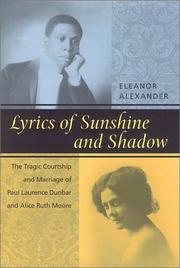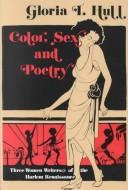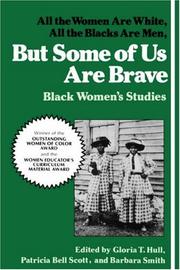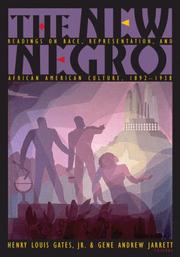| Listing 1 - 6 of 6 |
Sort by
|

ISBN: 0814707556 058543459X 9780585434599 9780814706961 0814706967 9780814707555 Year: 2001 Publisher: New York : New York University Press,
Abstract | Keywords | Export | Availability | Bookmark
 Loading...
Loading...Choose an application
- Reference Manager
- EndNote
- RefWorks (Direct export to RefWorks)
A New York Times Notable Book of 2002! Sexism, racism, self-hatred, and romantic love: all figure in prominently in this scholarly-but nicely hard-boiled-discussion of the bond between the famous Paul Laurence Dunbar and his wife Alice. Eleanor Alexander's analysis of turn-of-the-twentieth-century black marriage is required reading for every student of American, especially African-American, heterosexual relationships."-Nell Painter, Edwards Professor of American History, Princeton University, Author of Sojourner Truth, A Life, A Symbol "Rich in documentation and generous in analysis, Lyrics of Sunshine and Shadow advances our understanding of late nineteenth- and early twentieth-century African American social and cultural history in compelling and unexpected ways. By exposing the devastating consequences of unequal power dynamics and gender relations in the union of the celebrated writers, Paul Laurence Dunbar and Alice Ruth Moore, and by examining the hidden underside of the Dunbars' storybook romance where alcohol, sex, and violence prove fatal, Eleanor Alexander produces a provocative, nuanced interpretation of late Victorian courtship and marriage, of post-emancipation racial respectability and class mobility, of pre-modern sexual rituals and color conventions in an emergent elite black society."-Thadious M. Davis, Vanderbilt University "Eleanor Alexander's vivid account of the most famous black writer of his day, Paul Laurence Dunbar, and his wife Alice, illuminates the world of the African American literati at the opening of the twentieth century. The Dunbars' fairy-tale romance ended abruptly, when Alice walked out on her alcoholic, abusive spouse. Alexander's access to scores of intimate letters and her sensitive interpretation of the Dunbars mercurial highs and lows reveal the tragic consequences of mixing alcohol, ambition and amour. The Dunbars were precursors for another doomed duo: Scott and Zelda Fitzgerald. Alexander's poignant story of the Dunbars sheds important light on love and violence among DuBois's "talented tenth." -Catherine Clinton, author of Fanny Kemble's Civil Wars "Lyrics of Sunshine and Shadow debunks Dunbar myths... Lyrics asks us to consider the ways in which racism and sexism operate together."- The CrisisOn February 10, 1906, Alice Ruth Moore, estranged wife of renowned early twentieth-century poet Paul Laurence Dunbar, boarded a streetcar, settled comfortably into her seat, and opened her newspaper to learn of her husband's death the day before. Paul Laurence Dunbar, son of former slaves, whom Frederick Douglass had dubbed "the most promising young colored man in America," was dead from tuberculosis at the age of 33. Lyrics of Sunshine and Shadow traces the tempestuous romance of America's most noted African-American literary couple. Drawing on a variety of love letters, diaries, journals, and autobiographies, Eleanor Alexander vividly recounts Dunbar's and Moore's tumultuous affair, from a courtship conducted almost entirely through letters and an elopement brought on by Dunbar's brutal, drunken rape of Moore, through their passionate marriage and its eventual violent dissolution in 1902. Moore, once having left Dunbar, rejected his every entreaty to return to him, responding to his many letters only once, with a blunt, one-word telegram ("No"). This is a remarkable story of tragic romance among African-American elites struggling to define themselves and their relationships within the context of post-slavery America. As such, it provides a timely examination of the ways in which cultural ideology and politics shape and complicate conceptions of romantic love.
African Americans --- African American authors --- Married people --- Poets, American --- Authors, American --- Authors' spouses --- Dunbar-Nelson, Alice Moore, --- Dunbar, Paul Laurence, --- Nelson, Alice Ruth Moore Dunbar, --- Dunbar, Alice, --- Dunbar, Alice Moore, --- Dunbar-Nelson, Alice, --- Nelson, Alice Moore Dunbar-, --- Moore, Alice Ruth, --- Dunbar, Paul Lawrence, --- Marriage.

ISBN: 0253204305 Year: 1987 Publisher: Bloomington (IN) : Indiana University Press,
Abstract | Keywords | Export | Availability | Bookmark
 Loading...
Loading...Choose an application
- Reference Manager
- EndNote
- RefWorks (Direct export to RefWorks)
African Americans in literature --- Afro-Americans in literature --- Afro-Amerikanen in de literatuur --- Afro-Américains dans la littérature --- Amerikaanse zwarten in de literatuur --- Black Americans in literature --- Harlem Renaissance --- Negroes in literature --- Noirs américains dans la littérature --- Zwarte Amerikanen in de literatuur --- American poetry --- African American authors --- History and criticism --- Women authors --- 20th century --- Dunbar-Nelson, Alice Moore --- Criticism and interpretation --- Grimké, Angelina Weld --- Johnson, Georgia Douglas --- Women and literature --- United States --- African American women poets --- New York (N.Y.) --- Biography --- Harlem Renaissance. --- Dunbar-nelson (alice) --- Grimke (angelica) --- Johnson (georgia douglas)

ISBN: 0912670959 9780912670959 Year: 1992 Publisher: New York, N.Y. Feminist Press
Abstract | Keywords | Export | Availability | Bookmark
 Loading...
Loading...Choose an application
- Reference Manager
- EndNote
- RefWorks (Direct export to RefWorks)
Deze publicatie brengt een aantal teksten over de representatie van de Afrikaanse vrouwen in het feminisme bij elkaar, geschreven door Afrikaanse vrouwen die geboren en getogen zijn in Afrika en nu lesgeven in de Verenigde Staten. Zij bekijken een brede waaier van onderwerpen als het gebruik en misbruik van het onderwerp van vrouwenbesnijdenis in het globale feministische discours en de criminalistische benadering hiervan, het effect van het beeld van de Afrikaanse vrouw als slachtoffer in het ontwikkelingsbeleid, genderimperialisme, enz…
Fiction --- Social sciences (general) --- Sociology of minorities --- Sociology of the family. Sociology of sexuality --- United States --- Afro-Amerikaanse vrouwen --- Femmes afro-americaines --- Race relations --- Feminism --- African American women --- Bibliography --- Hurston, Zora Neale --- Criticism and interpretation --- Morrison, Toni --- Petry, Ann Lane --- Walker, Alice --- Washington, Mary Helen --- Fauset, Jessie Redmon --- Brooks, Gwendolyn --- Hansberry, Lorraine --- Walker, Alice, 1944 --- -Criticism and interpretation --- African American women. --- Noires américaines. --- Féminisme --- Relations interethniques --- Noires américaines --- Féminisme noir --- Histoire. --- États-Unis. --- Dunbar-Nelson, Alice Moore, --- Dunbar-Nelson, Alice Moore --- Hurston, Zora Neale. --- Race relations. --- Womanisme --- United States of America --- Literature --- Racism --- Social sciences --- Women --- Blackness --- Book
Book
ISBN: 9780822358114 9780822357971 Year: 2015 Publisher: Durham ; London : Duke University Press,
Abstract | Keywords | Export | Availability | Bookmark
 Loading...
Loading...Choose an application
- Reference Manager
- EndNote
- RefWorks (Direct export to RefWorks)
Black Atlas presents definitive new approaches to black geography. It focuses attention on the dynamic relationship between place and African American literature during the long nineteenth century, a volatile epoch of national expansion that gave rise to the Civil War, Reconstruction, Pan–Americanism, and the black novel. Judith Madera argues that spatial reconfiguration was a critical concern for the era's black writers, and she also demonstrates how the possibility for new modes of representation could be found in the radical redistricting of space. Madera reveals how crucial geography was to the genre-bending works of writers such as William Wells Brown, Martin Delany, James Beckwourth, Pauline Hopkins, Charles Chesnutt, and Alice Dunbar-Nelson. These authors intervened in major nineteenth-century debates about free soil, regional production, Indian deterritorialization, internal diasporas, pan–American expansionism, and hemispheric circuitry. Black geographies stood in for what was at stake in negotiating a shared world.
Littérature américaine --- Littérature et géographie --- Lieu (philosophie) --- Territorialité humaine --- Auteurs noirs américains --- Histoire et critique --- Dans la littérature --- American literature --- African American authors --- History and criticism --- 19th century --- Brown, William Wells --- Criticism and interpretation --- Delany, Martin Robison --- Dunbar-Nelson, Alice Moore --- Beckwourth, James Pierson --- Dans la littérature. --- Histoire et critique.
Book
ISBN: 081738717X 9780817387174 9780817313388 0817313389 Year: 2014 Publisher: Tuscaloosa : University Alabama Press,
Abstract | Keywords | Export | Availability | Bookmark
 Loading...
Loading...Choose an application
- Reference Manager
- EndNote
- RefWorks (Direct export to RefWorks)
"Race and Culture in New Orleans Stories posits that the Crescent City and the surrounding Louisiana bayous were a logical setting for the literary exploration of crucial social problems in America. Race and Culture in New Orleans Stories is a study of four volumes of interrelated short stories set in New Orleans and the surrounding Louisiana bayous: Kate Chopin's Bayou Folk; George Washington Cable's Old Creole Days; Grace King's Balcony Stories; and Alice Dunbar-Nelson's The Goodness of St. Rocque and Other Stories. James Nagel argues that the conflicts and themes in these stories cannot be understood without a knowledge of the unique historical context of the founding of Louisiana, its four decades of rule by the Spanish, the Louisiana Purchase and the resulting cultural transformations across the region, Napoleonic law, the Code Noir, the plaçage tradition, the immigration of various ethnic and natural groups into the city, and the effects of the Civil War and Reconstruction. All of these historical factors energize and enrich the fiction of this important region. The literary context of these volumes is also central to understanding their place in literary history. They are short-story cycles--collections of short fiction that contain unifying settings, recurring characters or character types, and central themes and motifs. They are also examples of the "local color" tradition in fiction, a movement that has been much misunderstood. Nagel maintains that "local color" literature was meant to be the highest form of American writing, not the lowest, and its objective was to capture the locations, folkways, values, dialects, conflicts, and ways of life in the various regions of the country in order to show that the lives of common citizens were sufficiently important to be the subject of serious literature. Finally, Nagel shows that New Orleans provided a profoundly rich and complex setting for the literary exploration of some of the most crucial social problems in America, including racial stratification, social caste, economic exploitation, and gender roles, all of which were undergoing rapid transformation at the end of the nineteenth century and the beginning of the twentieth"--
LITERARY CRITICISM / American / General. --- Social problems in literature. --- Social change in literature. --- Social structure in literature. --- Local color in literature. --- American literature --- English literature --- Agrarians (Group of writers) --- History and criticism. --- Cable, George Washington, --- Dunbar-Nelson, Alice Moore, --- King, Grace Elizabeth, --- Chopin, Kate, --- Cable, G. W. --- Dunbar, Paul Laurence, --- Nelson, Alice Ruth Moore Dunbar, --- Dunbar, Alice, --- Dunbar, Alice Moore, --- Dunbar-Nelson, Alice, --- Nelson, Alice Moore Dunbar-, --- Moore, Alice Ruth, --- Chopin, Kate O'Flaherty, --- Chopin, Katherine O'Flaherty, --- O'Flaherty, Catherine, --- Criticism and interpretation. --- New Orleans (La.) --- Big Easy (La.) --- Crescent City (La.) --- La Nouvelle-Orléans (La.) --- NOLA (La.) --- Nawlins (La.) --- Neu Orleans (La.) --- Nieuw Orleans (La.) --- Nouvelle-Orléans (La.) --- Neuva Orleans (La.) --- Nueva Orleans (La.) --- Nuova Orleans (La.) --- City of New Orleans (La.) --- Cité d'Orléans (La.) --- Orleans Parish (La.) --- In literature.

ISBN: 9780691126517 0691126518 9780691126524 0691126526 1400827876 Year: 2007 Publisher: Princeton, NJ : Princeton University Press,
Abstract | Keywords | Export | Availability | Bookmark
 Loading...
Loading...Choose an application
- Reference Manager
- EndNote
- RefWorks (Direct export to RefWorks)
When African American intellectuals announced the birth of the "New Negro" around the turn of the twentieth century, they were attempting through a bold act of renaming to change the way blacks were depicted and perceived in America. By challenging stereotypes of the Old Negro, and declaring that the New Negro was capable of high achievement, black writers tried to revolutionize how whites viewed blacks--and how blacks viewed themselves. Nothing less than a strategy to re-create the public face of "the race," the New Negro became a dominant figure of racial uplift between Reconstruction and World War II, as well as a central idea of the Harlem, or New Negro, Renaissance. Edited by Henry Louis Gates, Jr., and Gene Andrew Jarrett, The New Negro collects more than one hundred canonical and lesser-known essays published between 1892 and 1938 that examine the issues of race and representation in African American culture. These readings--by writers including W.E.B. Du Bois, Paul Laurence Dunbar, Alain Locke, Carl Van Vechten, Zora Neale Hurston, and Richard Wright--discuss the trope of the New Negro, and the milieu in which this figure existed, from almost every conceivable angle. Political essays are joined by essays on African American fiction, poetry, drama, music, painting, and sculpture. More than fascinating historical documents, these essays remain essential to the way African American identity and history are still understood today.
Sociology of minorities --- American literature --- Sociology of culture --- anno 1900-1999 --- African Americans in literature --- Afro-Americans in literature --- Afro-Amerikanen in de literatuur --- Afro-Américains dans la littérature --- Amerikaanse zwarten in de literatuur --- Black Americans in literature --- Negroes in literature --- Noirs américains dans la littérature --- Zwarte Amerikanen in de literatuur --- African Americans --- English literature --- Agrarians (Group of writers) --- African American intellectuals --- Intellectual life --- African American authors&delete& --- History and criticism --- United States --- Africa --- Civilization --- African influences. --- African American authors --- 20th century --- African American influences --- LITERARY COLLECTIONS / American / African-American. --- Adams, John Quincy. --- African Methodism. --- African music. --- Army of the James. --- Babbitt figure. --- Bad Lazarus figure. --- Bandana Land (musical show). --- Belgium. --- Caedmon. --- Cape Colony. --- Cervantes, Miguel de. --- Clarkson, Thomas. --- Cohen, Octavius Roy. --- Cotton Pickers. --- Dahomey. --- Dunbar-Nelson, Alice. --- Egyptian art. --- Family Story Paper. --- Federal Theatre Project. --- Gabon. --- Garveyism. --- Giraudoux, Jean. --- Gompers, Samuel. --- Grant, Duncan. --- Guernica. --- Hamilton, Thomas. --- Harold (anonymous). --- Harper’s Ferry. --- Hawkins, Coleman. --- Henson, Josiah. --- Kadalie, Clements. --- Kirkpatrick, Sidney. --- Knoxville College. --- Lafayette Players. --- Manchuria. --- National Academy of Design. --- cabarets. --- chicken wheel (dance). --- communism. --- composers. --- democracy. --- economics: Barnes on. --- environment. --- gambling. --- immigration. --- imperialism. --- intelligentsia. --- internationalism. --- jazz instruments. --- jazz orchestra. --- liberalism. --- medical profession. --- African Americans in literature. --- History and criticism. --- Intellectual life. --- Civilization. --- African American literature (English) --- Black literature (American) --- Negro literature --- Barbarism --- Civilisation --- Auxiliary sciences of history --- Culture --- World Decade for Cultural Development, 1988-1997 --- African American authors. --- Afro-American authors --- Negro authors --- United States. --- ABŞ --- ABSh --- Ameerika Ühendriigid --- America (Republic) --- Amerika Birlăshmish Shtatlary --- Amerika Birlăşmi Ştatları --- Amerika Birlăşmiş Ştatları --- Amerika ka Kelenyalen Jamanaw --- Amerika Qūrama Shtattary --- Amerika Qŭshma Shtatlari --- Amerika Qushma Shtattary --- Amerika (Republic) --- Amerikai Egyesült Államok --- Amerikanʹ Veĭtʹsėndi︠a︡vks Shtattnė --- Amerikări Pĕrleshu̇llĕ Shtatsem --- Amerikas Forenede Stater --- Amerikayi Miatsʻyal Nahangner --- Ameriketako Estatu Batuak --- Amirika Carékat --- AQSh --- Ar. ha-B. --- Arhab --- Artsot ha-Berit --- Artzois Ha'bris --- Bí-kok --- Ē.P.A. --- EE.UU. --- Egyesült Államok --- ĒPA --- Estados Unidos --- Estados Unidos da América do Norte --- Estados Unidos de América --- Estaos Xuníos --- Estaos Xuníos d'América --- Estatos Unitos --- Estatos Unitos d'America --- Estats Units d'Amèrica --- Ètats-Unis d'Amèrica --- États-Unis d'Amérique --- Fareyniḳṭe Shṭaṭn --- Feriene Steaten --- Feriene Steaten fan Amearika --- Forente stater --- FS --- Hēnomenai Politeiai Amerikēs --- Hēnōmenes Politeies tēs Amerikēs --- Hiwsisayin Amerikayi Miatsʻeal Tērutʻiwnkʻ --- Istadus Unidus --- Jungtinės Amerikos valstybės --- Mei guo --- Mei-kuo --- Meiguo --- Mî-koet --- Miatsʻyal Nahangner --- Miguk --- Na Stàitean Aonaichte --- NSA --- S.U.A. --- SAD --- Saharat ʻAmērikā --- SASht --- Severo-Amerikanskie Shtaty --- Severo-Amerikanskie Soedinennye Shtaty --- Si︠e︡vero-Amerikanskīe Soedinennye Shtaty --- Sjedinjene Američke Države --- Soedinennye Shtaty Ameriki --- Soedinennye Shtaty Severnoĭ Ameriki --- Soedinennye Shtaty Si︠e︡vernoĭ Ameriki --- Spojené obce severoamerické --- Spojené staty americké --- SShA --- Stadoù-Unanet Amerika --- Stáit Aontaithe Mheiriceá --- Stany Zjednoczone --- Stati Uniti --- Stati Uniti d'America --- Stâts Unîts --- Stâts Unîts di Americhe --- Steatyn Unnaneysit --- Steatyn Unnaneysit America --- SUA (Stati Uniti d'America) --- Sŭedineni amerikanski shtati --- Sŭedinenite shtati --- Tetã peteĩ reko Amérikagua --- U.S. --- U.S.A. --- United States of America --- Unol Daleithiau --- Unol Daleithiau America --- Unuiĝintaj Ŝtatoj de Ameriko --- US --- USA --- Usono --- Vaeinigte Staatn --- Vaeinigte Staatn vo Amerika --- Vereinigte Staaten --- Vereinigte Staaten von Amerika --- Verenigde State van Amerika --- Verenigde Staten --- VS --- VSA --- Wááshindoon Bikéyah Ałhidadiidzooígíí --- Wilāyāt al-Muttaḥidah --- Wilāyāt al-Muttaḥidah al-Amirīkīyah --- Wilāyāt al-Muttaḥidah al-Amrīkīyah --- Yhdysvallat --- Yunaeted Stet --- Yunaeted Stet blong Amerika --- ZDA --- Združene države Amerike --- Zʹi︠e︡dnani Derz︠h︡avy Ameryky --- Zjadnośone staty Ameriki --- Zluchanyi︠a︡ Shtaty Ameryki --- Zlucheni Derz︠h︡avy --- ZSA --- Η.Π.Α. --- Ηνωμένες Πολιτείες της Αμερικής --- Америка (Republic) --- Американь Вейтьсэндявкс Штаттнэ --- Америкӑри Пӗрлешӳллӗ Штатсем --- САЩ --- Съединените щати --- Злучаныя Штаты Амерыкі --- ولايات المتحدة --- ولايات المتّحدة الأمريكيّة --- ولايات المتحدة الامريكية --- 미국 --- États-Unis --- É.-U. --- ÉU --- African Americans as literary characters --- Amerikanʹ Veĭtʹsėndi͡avks Shtattnė --- Si͡evero-Amerikanskīe Soedinennye Shtaty --- Soedinennye Shtaty Si͡evernoĭ Ameriki --- SUA --- Zʹi͡ednani Derz͡havy Ameryky --- Zluchanyi͡a Shtaty Ameryki --- Zlucheni Derz͡havy --- Harper's Ferry.
| Listing 1 - 6 of 6 |
Sort by
|

 Search
Search Feedback
Feedback About
About Help
Help News
News